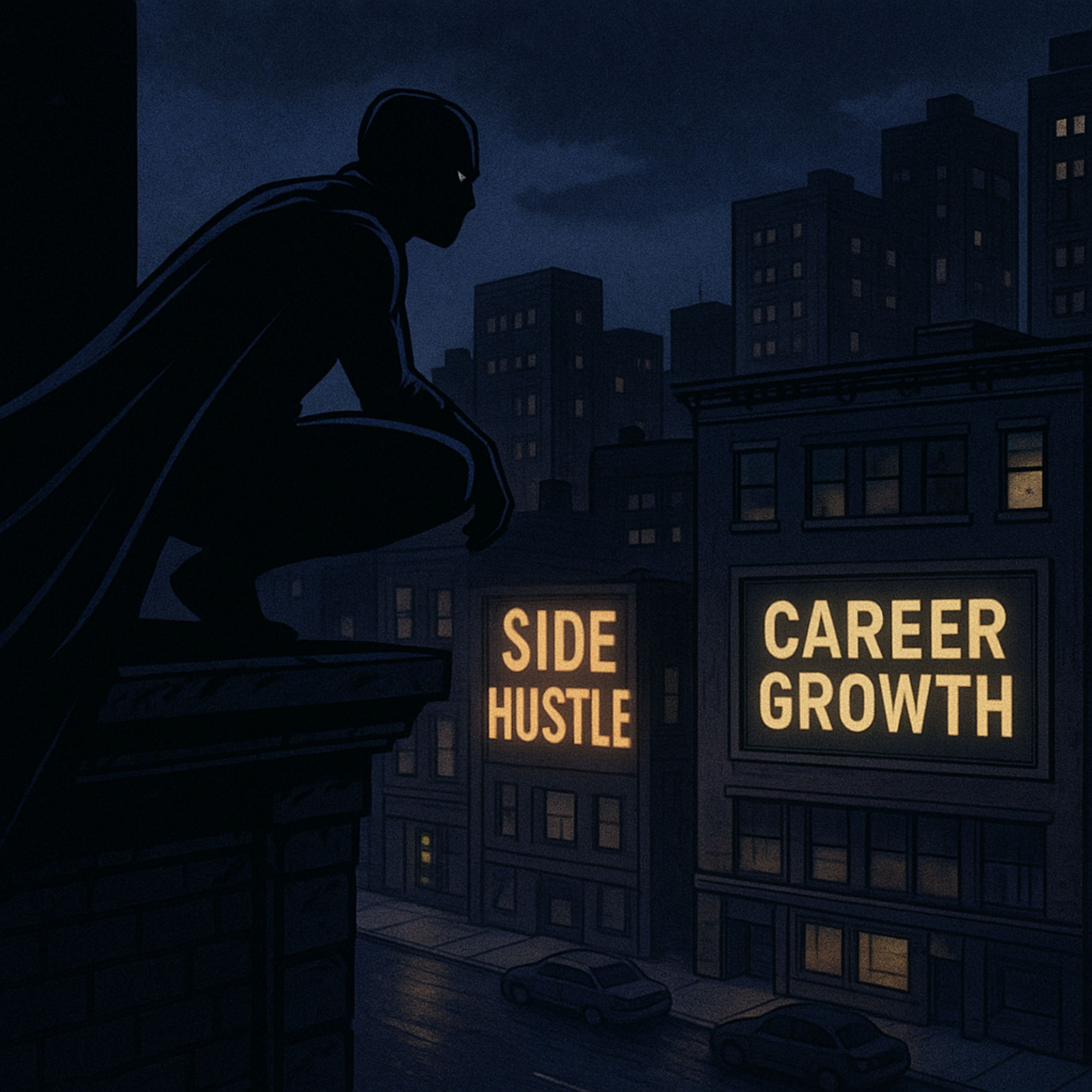Building a Side Hustle - MAC114


How to Start a Side Hustle Without Sabotaging Your Career
A side hustle can feel like freedom — a chance to earn extra income, explore your creativity, and maybe even test-drive that business idea that’s been living in your head for years. It’s exciting, empowering, and sometimes even career-changing. But it can also be risky. The wrong move could damage your professional reputation, violate company policy, or simply stretch you too thin to perform well in your day job.
Today, we’re diving into something that’s become almost expected in the modern workplace: the side hustle. Whether it’s freelancing, consulting, selling online, or creating content, nearly half of all professionals now have one. But the real question is: should you? Let’s explore why building a side hustle might be one of the smartest career decisions you can make… or one of the most dangerous.
Legal Considerations: Know Before You Start
Before we get into the whys and whatfors of a side hustle, let’s talk about something far less exciting but absolutely essential — the legal stuff. Most of the risks fall into three big categories: non-compete clauses, confidentiality agreements, and intellectual property ownership.
Let’s start with non-compete clauses. These can limit your ability to do similar work or serve similar clients — even on your own time. Some expire when you leave your employer, while others can follow you for months, or even years, afterward. Then there’s confidentiality. If your job gives you access to inside information, proprietary data, or key contacts, using them in your side hustle isn’t just unethical — it could be illegal.
And finally, there’s intellectual property. If you’re using company time, equipment, or resources to build your side hustle, your employer might legally own part — or all — of what you’ve created. The safest approach? Use your own tools, your own time, and your own money. And if you’re unsure what you can and can’t do, have a candid conversation with your manager or HR, and consider a quick consult with an employment lawyer. One hour of legal advice now can save you a career’s worth of regret later.
Why Side Hustles Are Appealing
So, with the legal stuff out of the way, let’s talk about what makes a side hustle so appealing. A side hustle can give you things your day job often doesn’t: control over decisions — both creative and strategic, financial freedom, and personal growth. You get to experiment, try new ideas, and see the direct impact of your efforts — something that’s often hard to find in larger corporate environments.
Then there’s the financial side. An extra stream of income can ease financial pressure, help you build savings, or fund your next big move. Down the line, it could even replace your primary income entirely. But here’s what often gets overlooked: a side hustle can also make you better at your day job. Running something on your own forces you to learn new skills — marketing, negotiation, time management, customer service. You start thinking like an owner, not just an employee. And that mindset shift — from doing to owning — is exactly what separates good employees from promotable ones. So yes, there’s a lot to gain.
The Catch: Risks of a Side Hustle
With all of those benefits, what’s the catch? Having a side hustle isn’t for everyone. First, it demands time — lots of it. If your plate is already full with work, family, or personal commitments, launching a side business can quickly push you toward burnout. Nights, weekends, and even vacations can disappear under deadlines and client needs.
Second, it can blur the lines between your personal and professional life. Maybe your employer frowns on consulting on the side, or coworkers begin to question your focus. And then there’s the legal side — those non-compete clauses, confidentiality agreements, and conflict-of-interest policies we talked about earlier aren’t just suggestions. For example, if you work in marketing and take freelance marketing clients, your company could see that as direct competition. Even if you’re not poaching clients, it could still violate your contract.
Finally, there’s reputational risk. If your side hustle doesn’t align with your company’s values or brand, it can raise questions about your judgment — especially if you hold a leadership position. So before you start, don’t just ask, “What could I gain?” Ask, “What could I lose?”
How to Start a Side Hustle Safely
So, how do you actually start a side hustle without jeopardizing your main job? First, get clear on your goal. Why are you starting this side project? Are you aiming to make extra money, build skills, or create a potential escape route? Knowing your primary purpose will shape every decision you make.
Next, review your company policies. Pull out your employment agreement and look for keywords like non-compete, moonlighting, or conflict of interest. If anything is unclear, talk to HR or even get legal advice — it’s always better to ask up front than apologize later. And if your side hustle could intersect with your company in any way, have a short, professional conversation with your manager. Transparency builds trust and reduces future headaches.
As you explore opportunities for your side hustle, focus on opportunities that are complementary to your role and your company — not competitive. The further your side hustle is from your company’s core business, the less likely you are to run into trouble. Start simple; you don’t need a flashy launch with a social media blitz. Test your idea, see if you even enjoy it, and consider leveraging your strengths or learning new growth-oriented skills. The best side hustles grow naturally, without forcing pressure or overcommitment.
And finally, protect your time. Your main job still pays the bills, and if your performance starts slipping, your side hustle could become a liability instead of an asset. Treat it like a project, not a full-time job — and build it carefully, step by step.
Long-Term Career Benefits of a Side Hustle
So, you’ve started a side hustle and it’s gaining traction — now how can you use it to advance your career? Wearing all the hats in your side project teaches skills you can bring back to your day job. Building a small website might help you understand digital marketing. Handling customers could sharpen your communication or sales skills. Even if these skills aren’t directly related to your current role, they can open doors for lateral moves or promotions within your company.
A successful side hustle also signals initiative. It tells your employer that you’re resourceful, entrepreneurial, and capable of managing yourself — qualities that can lead to promotions, invitations to high-visibility projects, or even career pivots. Beyond that, your side project can expand your network, connecting you with people outside your usual circle: new industries, mentors, and opportunities. Remember, your network is one of the most powerful tools you have for career growth.
And let’s be honest — this day and age, no job is permanent. A side hustle provides both a safety net and a sense of autonomy. Much like investing, having diversified sources of income puts you in a stronger position when one opportunity disappears. When done ethically, responsibly, and strategically, a side hustle doesn’t just pad your wallet — it builds your career capital.
Closing Thoughts
A side hustle can be one of the best professional development tools you’ll ever have — or the biggest career misstep you’ll make. The difference comes down to how intentionally you approach it. If today’s episode got you thinking about your own side hustle — or helped you avoid a costly mistake — share it with a friend or teammate. Maybe someone who’s been talking about starting something on the side but isn’t sure where to begin.
And if you haven’t already, go to https://managingacareer.com/follow to subscribe to Managing A Career wherever you listen to podcasts. Your growth is your responsibility — and this show is here to make that journey easier, one step at a time.
TAKE THE SURVEY!
Are you looking for a career coach? If you reach out to me via the contact form, I will arrange an introductory session where we can talk about your career goals and how I can help. If we're a good fit, we can schedule regular coaching sessions.





















